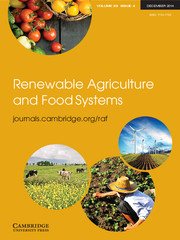Article contents
Profitability prospects, risk aversion and time preferences of soybean producers in the region of Santarém, Brazilian Amazon: perspectives for an ecological transition
Published online by Cambridge University Press: 18 November 2020
Abstract
Reducing adverse environmental consequences of modern industrial agriculture requires an ecological transition of agricultural practices. An important determinant of adoption of new agricultural practices by producers is the perceived profitability of these practices. The profitability of ecological agricultural practices tends to rely on improved crop prices and reduced input use. Transition to such practices often entails increased profit volatility (risk) and long-term returns (temporal profile). Ideal candidates for transition would therefore be aware of the output price and input costs dimensions of their profitability, as well as willing to assume some risks and show patience to value long-term returns. We assessed the potential for such a transition along these three dimensions (profitability, risk aversion and time preferences) in a group of soybean producers in the agricultural frontier of the Brazilian Amazon. Primary data were collected using a questionnaire and economic tests in the region of Santarém (State of Pará, Brazil). We found that, while these producers have a low-risk aversion that could favor the adoption of new ecological practices, their focus on increasing yields to enhance profits and their high discount rates considerably reduces their propensity to adopt these practices.
- Type
- Research Paper
- Information
- Copyright
- Copyright © The Author(s), 2020. Published by Cambridge University Press
References
- 2
- Cited by



